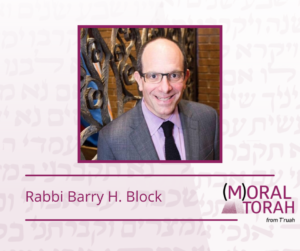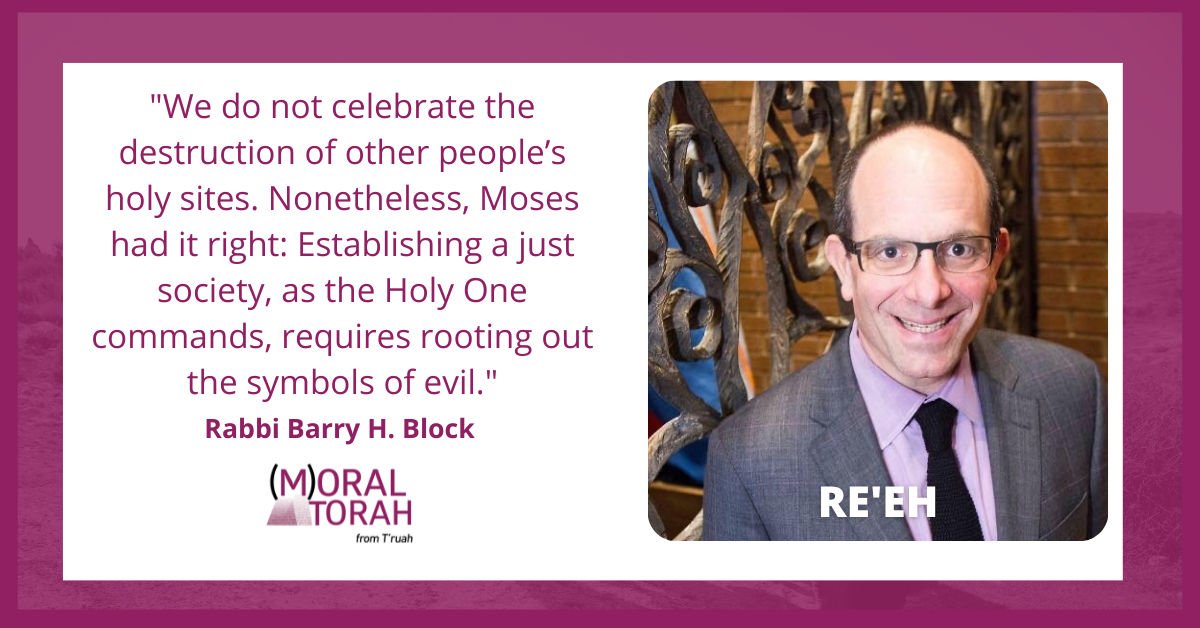A D’var Torah for Re’eh by Rabbi Barry H. Block
As the Israelites prepare to cross the Jordan River to enter the Promised Land, Moses instructs them:
“You must destroy all the sites at which the nations you are to dispossess worshiped their gods…Tear down their altars, smash their pillars, put their sacred posts to the fire, and cut down the images of their gods, obliterating their name from that site” (Deuteronomy 12:2-3).
The commandment seems awfully harsh, even unforgivably disrespectful to other people’s faith. However, as Rabbi Ariel Naveh writes in The Social Justice Torah Commentary (p. 295),
“The purpose of the destruction… is to establish the land as the sacred and true birthright of the Israelites, but it is also to establish the necessary rites of worship and practice in order for that birthright to be continued. Worshiping idols, statues, and altars like the peoples who inhabited the land prior to the Israelites’ arrival would be anathema; a new precedent must be established…[F]or that precedent to hold, all remnants of the previous means of worship must be rooted out, desecrated, and fully destroyed.”
In our own country, in the aftermath of the Civil War, the United States occupied the defeated South and imposed a new racial order on the former Confederacy. Reconstruction, though, was short-lived. Soon, new iterations of enslavement, in the form of peonage and convict leasing, took hold. Jim Crow and lynching reinforced a racial hierarchy that persists even today, nearly sixty years after civil rights became the law of the land.
Sign up to receive (M)oral Torah in your inbox each week.
Brent Staples of the New York Times recently wrote that President Woodrow Wilson and his administration
“paid homage to the icons of white supremacy when they named military bases for the Confederate traitors who had waged war on this country with the aim of keeping Black people in chains. This gesture of federal fealty ratified the ‘Southern way of life’ at a time when Black people were being hanged, shot and burned alive before cheering crowds all over the Confederacy.”
Unlike Moses’s band of freed slaves — commanded to destroy the graven images they found in their new land, lest they lead them, too, into idolatry — the Civil War’s victors built and venerated monuments to the enslavers and to the enslavement that Union blood was copiously spilt to defeat.
At the Charlottesville “Unite the Right” rally of 2017 and at the Capitol insurrection of January 6, 2021, Confederate and Nazi insignia were flown side-by-side with American flags, as if symbols of white supremacy and genocide were patriotic. A few minutes’ drive from my house, the Arkansas Capitol grounds are home to multiple Confederate monuments. Those same grounds house no memorial to all who were tortured to death in this state as enslaved laborers or as victims of lynching.
Find more commentaries on Parshat Re’eh.
In 1913, the year that President Wilson was inaugurated, Julian Carr, a benefactor of “Silent Sam,” a Confederate monument erected on the campus of the University of North Carolina at Chapel Hill, acclaimed the statue as a testament to those who had given their lives for “the welfare of the Anglo Saxon race.” The statue both celebrated and fomented racist violence, just as Confederate and Nazi symbols did in Charlottesville in 2017 and at our nation’s Capitol in 2021.
Deuteronomy’s words are difficult to read. We do not celebrate the destruction of other people’s holy sites. Nonetheless, Moses had it right: Establishing a just society, as the Holy One commands, requires rooting out the symbols of evil. As Rabbi Naveh concludes, “We must destroy and annihilate not just the statues of old, but also the despicable mindset they represent. Only then will we as a society hopefully warrant the everlasting name promised to us in generations past.”
Rabbi Barry H. Block serves Congregation B’nai Israel in Little Rock, Arkansas. A proud T’ruah rabbi, Barry is the Vice President of Organizational Relationships of the CCAR and the editor of two award-winning books from CCAR Press, The Mussar Torah Commentary (2019) and The Social Justice Torah Commentary (2021).

